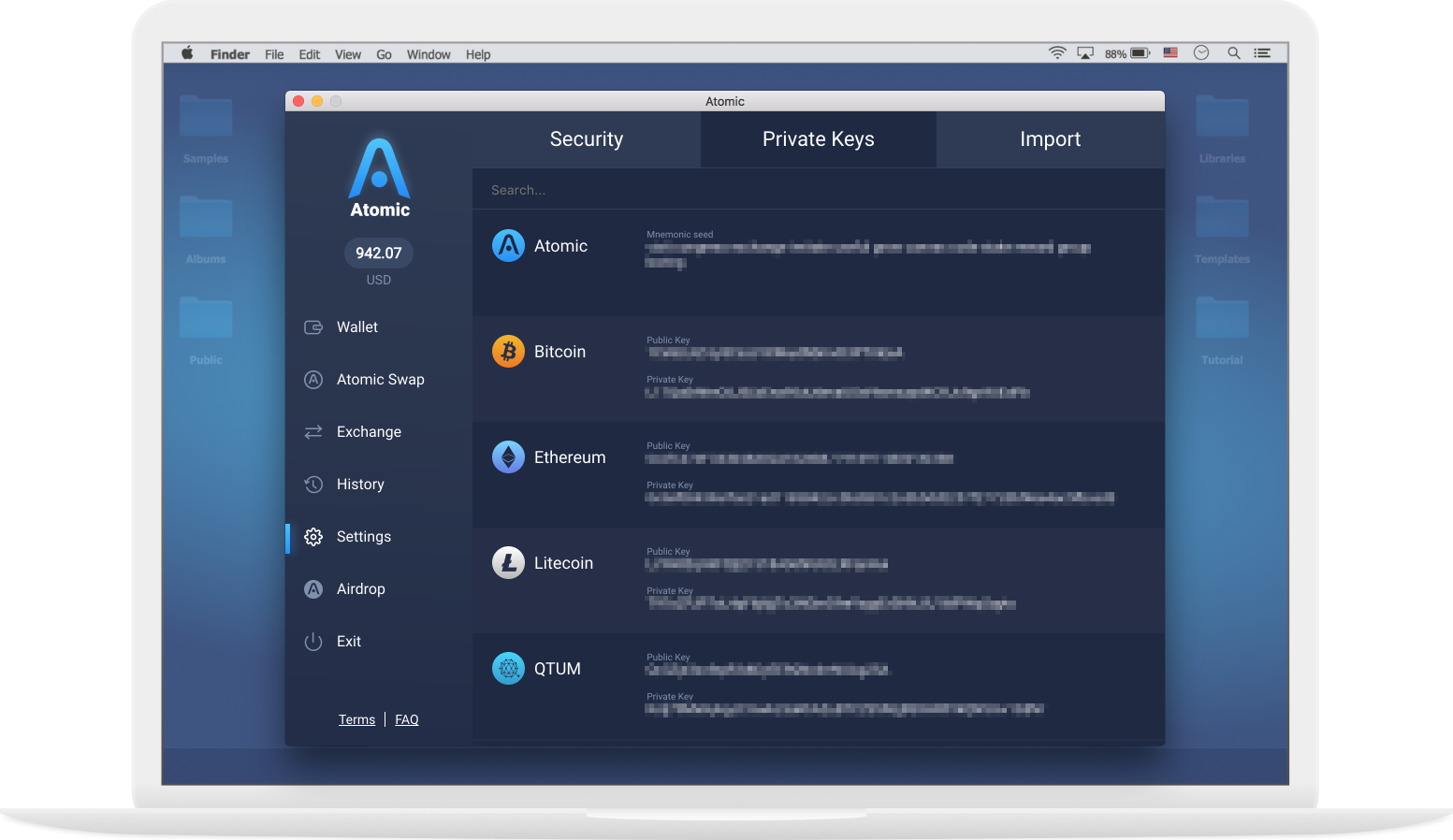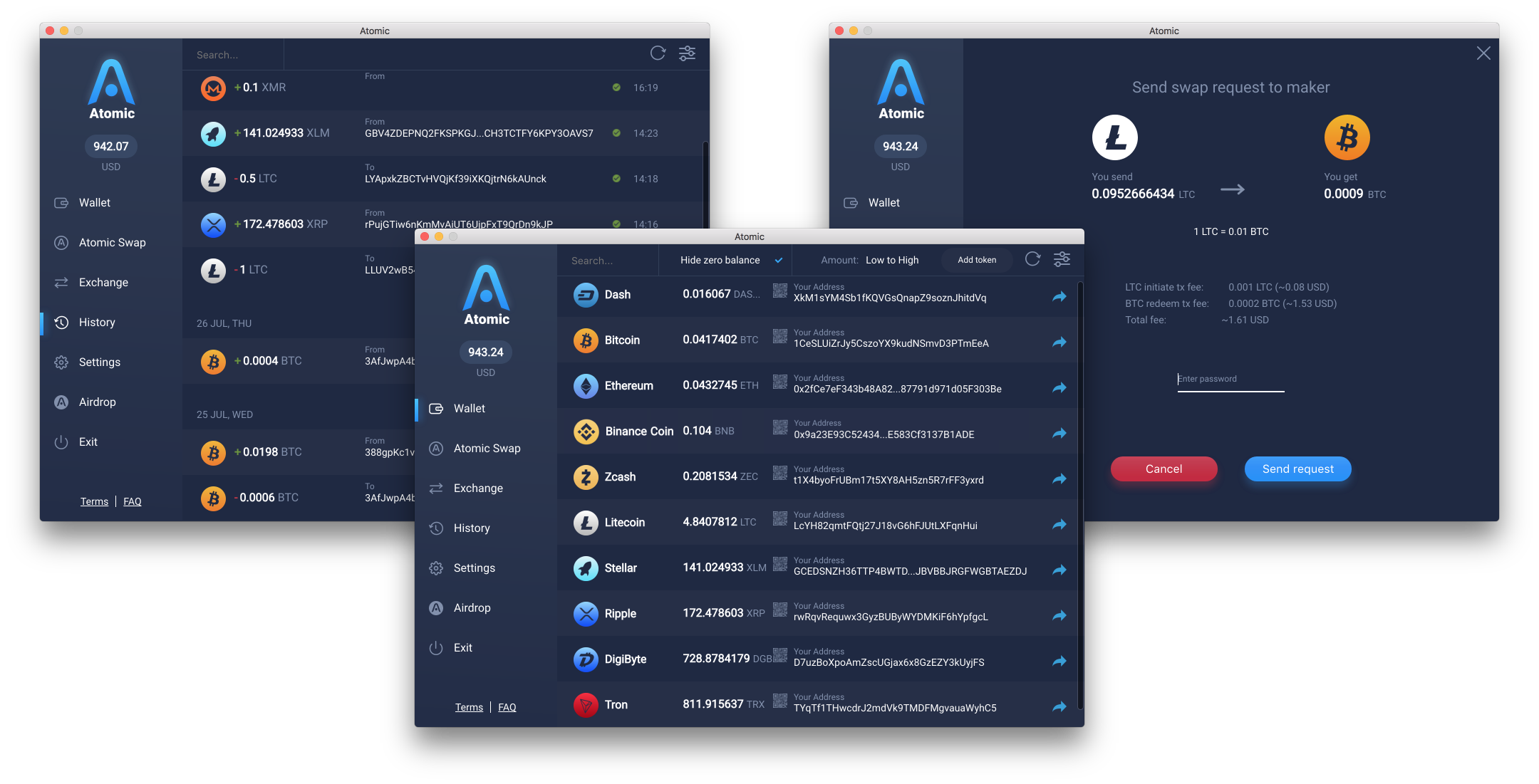The latest version of the wallet: 1.38.4
Manage your Bitcoin wisely!
Learn how to setup Atomic Wallet to send, receive, exchange and buy BTC.









Atomic Wallet provides a powerful, in-demand service
that allows users to reduce effort spent on managing crypto assets and
makes it transparent and reliable

Atomic Wallet is feature-packed. It is the most secure,
trustworthy, transparent and decentralized wallet solution you can imagine.
Download

Instant limitless exchange service, supporting 90+ altcoins
Private, convenient
and fast way to
exchange cryptos

Best option for uncensored cross-blockchain swaps
BTC is a peer-to-peer digital electronic cash created for multi-purpose use. It is the first digital cryptocurrency working without centralized governance. Bitcoin is a pioneer cryptocurrency that has the largest market capitalization.
Bitcoin whitepaper was published in late 2008, and the first block was mined by Satoshi Nakamoto in 2009. From that moment the story of the crypto industry as a whole begins: blockchain, transactions, miners, community growth, market swings, etc. It all started with Satoshi Nakamoto. Do you know who is he/she? We don’t. But in case you do, contact us at hello@atomicwallet.io and we will send you our tokens :)
Blockchain is a public ledger or distributed network on which all transactions go. All the transactions, history and other information is kept on the blockchain. All accounts’ data stored in blocks and in a fully encrypted manner (pseudonymity) which makes Bitcoin trustless and decentralized.
The blockchain works as a public ledger with a chain of interconnected blocks, each one of those contains a hash of the previous block. This chain leads to the first genesis block which was mined by Satoshi themself.
The Bitcoin blockchain is well protected from double spending, the common problem in the digital cash when you can make multiple transactions at one time and spend more coins than your account has.
Well, as it is a public ledger and all data and accounts are distributed across the network, there must be someone looking after. This is when miners come on the stage. While mining, they utilize a Proof-of-Work consensus algorithm that helps maintain the Bitcoin blockchain transparent, unified, trustless and decentralized.
Mining is a technical process and of adding transaction records to the Bitcoin public ledger. To add a new block, a miner must solve a puzzle, which is highly complicated and consumes a lot of computing resources.
Proof-of-Work is a consensus algorithm means that blocks should be mined and tuned to the certain standards on which the blockchain works.
Miners are volunteers that constantly using processing powers to find new blocks and help to develop Bitcoin blockchain. For each new block, they receive a reward in Bitcoin and they also take payments for transaction verification.
Due to the reward system in the Bitcoin blockchain, miners are interested in the stability of the blockchain. The more the blocks mined, the bigger the reward. They are interested in the fair transactions because they receive money for fees. Miners, indeed, do a lot all the work to keep the Bitcoin network sustainable.
Every Bitcoin transaction spends zero or more bitcoins on zero or more recipients. The difference between the amount being spent and the amount being received is the transaction fee (which must be zero or more).
By the design, Bitcoin's design makes it easy and efficient for the spender to specify how much fee to pay, whereas it would be harder and less efficient for the recipient to specify the fee. Hence, the spender is almost always solely responsible for paying all necessary Bitcoin transaction fees.
Whenever a miner creates a block proposal, this miner is entitled to specify where all the fees paid for the transactions in that block proposal should be sent. If the proposal results in a valid block broadcasted to the Bitcoin blockchain, the fee income will be sent to the specified recipient.
Bitcoin is maintained by a group of enthusiasts. It is run through an open network of supercomputers that are spread all over the world. Bitcoin is often an attractive prospect for people who don’t like the kind of government control and regulation that is associated with traditional currencies.
Fiat currencies such as the Dollar, Euro, and others have an unlimited supply. Central banks that control and regulate the currencies may decide to issue as many fiat currencies as they want and manipulate their values against each other.
Since there is no central agency that can validate Bitcoin transactions used in smart contracts, users can send and receive coins without the risk of revealing their identities. When a user submits a transaction request, the protocol simply checks all the previous transactions associated with the sender to see whether he or she has enough coins to complete the transaction.
Unlike the electronic fiat transactions, transactions involving Bitcoin cannot be reversed. This is simply because there is no way to do so. Fiat transactions will often have a mediation process where someone can seek redress in case they want a payment reversed. As for Bitcoin, once the transaction is recorded in the network and one hour has passed, then there is no way of reversing it.
There are tons of Bitcoin wallets. The crypto market can offer you a wide range of various wallet to manage your Bitcoins, so a regular non-tech-savvy user may find themself lost. Atomic Wallet provides you with a secure all-in-one solution to manage, buy and exchange BTC. The wallet supports Atomic Swaps and allows you to exchange Bitcoin to LTC or QTUM in a fully decentralized manner.
Try out new non-custodial solution. Via Atomic Wallet interface you can easily manage Bitcoin and over 300 top assets and tokens. Only you have control over your funds. Private keys never leave your device. Light and smooth interface for multi-purpose use. Try it out!
Team